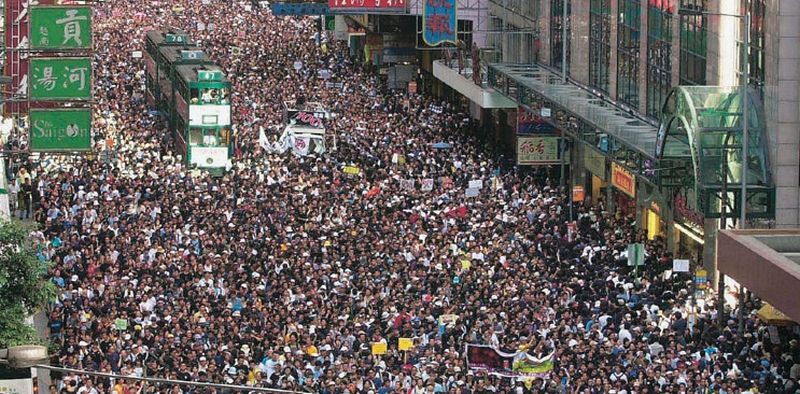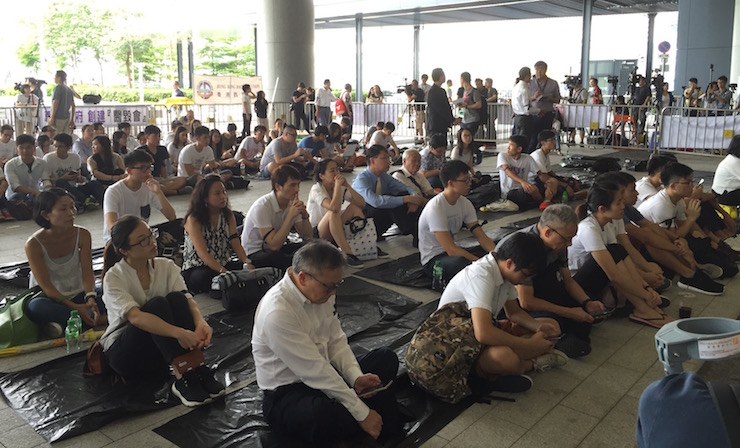Hong Kong opened a new chapter of “good administration and governance,” the city’s leader said on the day the “patriots only” elections produced a new legislature with 89 pro-establishment lawmakers and one self-declared centrist.

With no traditional opposition among its members and an “improved” legislature eager to offer its assistance to pass bills into laws, the government is poised to resurrect legislation previously blocked by filibustering democrats or withdrawn due to widespread public disapproval or protests.
HKFP rounds up some of the legislation on the horizon, as well as “back from the dead” proposals which were able to glide through the opposition-free chamber last year after democrats quit en masse.
Article 23, 2003
Article 23 of the Basic Law stipulates that the Hong Kong government shall enact laws to prohibit any act of treason, secession, sedition, or subversion against the central government.
In 2003, a push for Article 23 failed after more than 500,000 people took to the streets to peacefully oppose the bid to enact national security laws. In the years that followed, the reintroduction of the bill was central to every chief executive election.
Former leaders agreed and emphasised that it would be important to legislate, although doing so would require “suitable timing” to brace against opposition from the pro-democracy camp. Meanwhile, Beijing repeatedly said the city must make it a priority to revive Article 23 legislation.

After the legislature was overhauled and the democrats were swept out in late 2020, officials and pro-Beijing figures alike began making renewed calls to reintroduce the bill. It is expected to be enacted within the current legislative term, which ends in December 2025.
The day before lawmakers were sworn in this year, Secretary for Security Chris Tang said the legislation would include expanding existing laws against espionage, treason and official secrets.
Copyright (Amendment) Bill, 2011-2016
Dubbed “Internet Article 23” by opponents, the Copyright (Amendment) Bill first opened for public consultation in late 2006. The bill was intended to extend the protection of copyright to cyberspace, but it drew wide opposition as internet users feared it would ban satire or other derivative works, which were popular among online communities at the time.
Internet freedom advocates and pro-democracy lawmakers were concerned that it would become an affront against freedom of expression.

In response to such opposition, the government suspended the bill’s second reading in 2012. Two years later, the bill was reintroduced with revisions, in which works of satire or of current affairs commentary would be exempt, but “user-generated” content, such as music covers and re-dubbed songs, would still be subject to the law.
The revised bill did little to alleviate public concern.
Democrats filibustered during the bill’s second-reading in December 2015, which dragged on for three months. It was officially withdrawn in April 2016 after a motion to adjourn the debate was passed.

In her policy address last October, Lam said the government should again push for the Copyright (Amendment) Bill to achieve China’s plan for Hong Kong to become a hub for intellectual property.
In November, the government began a three-month public consultation for plans to amend the Copyright Ordinance, with Secretary for Commerce and Economic Development Edward Yau saying that “Hong Kong’s copyright regime is over a decade behind international developments.”
Medical Registration (Amendment) Bill, 2015-2021
First introduced in 2015, the controversial Medical Registration (Amendment) Bill proposed adding four individuals who were not doctors to the Medical Council.
Under the control of doctors, the council was said to protect the industry’s vested interests but not those of patients. It was also accused of being “protectionist” for doing little to alleviate the city’s chronic shortage of doctors, such as more easily allowing overseas doctors to work in Hong Kong.
Hundreds of doctors, medical students, medical associations and pro-democracy lawmakers staged a sit-in outside the Legislative Council on to oppose the amendment in June 2016. Opponents said they feared it would allow underqualified doctors from mainland China to practice in the city.
Proponents said that adding lay-members to the council would speed up the process of handling hundreds of medical malpractice complaints every year.

The Legislative Council’s discussion of the bill in 2016 was repeatedly postponed by a lack of quorum, or when there are too few lawmakers to hold a meeting, and by filibustering. Its most prominent opponent Leung Ka-Lau, a doctor and lawmaker in the medical functional constituency, submitted 112,000 amendments to the bill – they were all rejected. The bill was ultimately not able to move onto its third reading during the legislative term by the time it ended in July.
However, a revised version of the bill was re-tabled in May 2017 and was passed in just six hours in March 2018. Lawmakers said they supported it despite shortcomings, if only to avoid further delays in reforming the council.

The government submitted yet another Medical Registration (Amendment) Bill in May 2021, which would allow both permanent and non-permanent residents trained overseas as doctors or specialists to practice in the city under certain requirements. The amendments would also allow overseas specialists, who fit a list of criteria, to practice in the city without passing a licensing exam.
Former medical functional constituency lawmaker Pierre Chan said a the time that he was unable to sway the government or other lawmakers: “The political reality tells us that, in this legislative chamber today, my one-man effort is like a praying mantis trying to stop a chariot.”
The bill was debated and passed in less than five hours last October.
Support HKFP | Policies & Ethics | Error/typo? | Contact Us | Newsletter | Transparency & Annual Report | Apps
Help safeguard press freedom & keep HKFP free for all readers by supporting our team

HKFP has an impartial stance, transparent funding, and balanced coverage guided by an Ethics Code and Corrections Policy.
Support press freedom & help us surpass 1,000 monthly Patrons: 100% independent, governed by an ethics code & not-for-profit.










